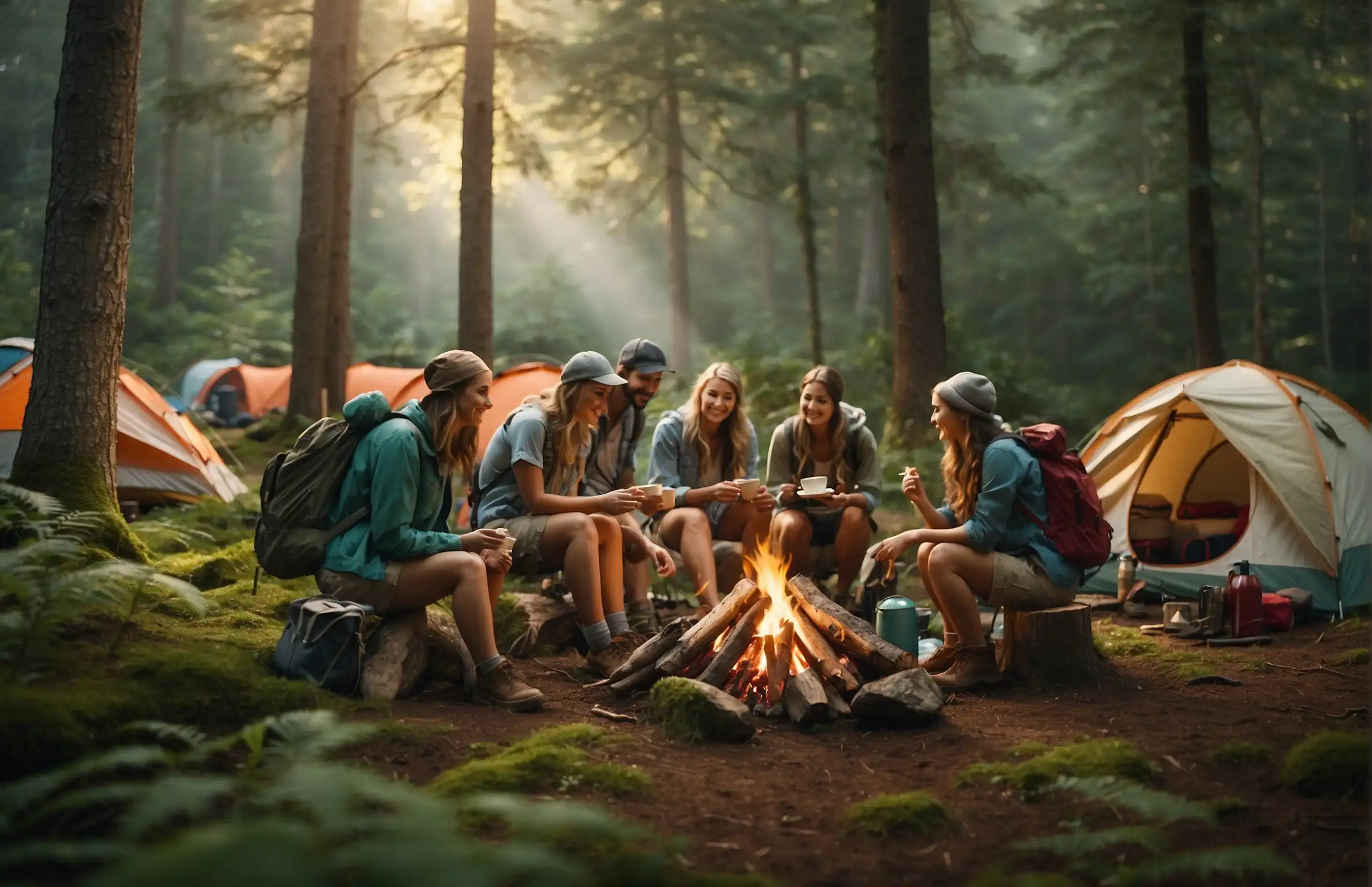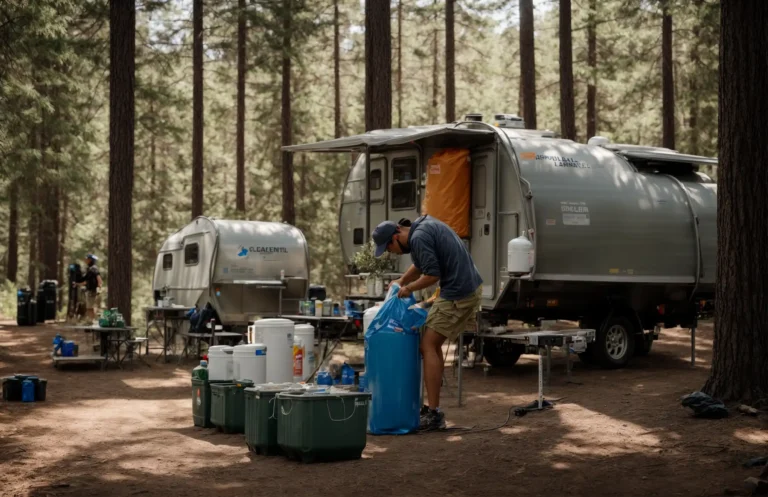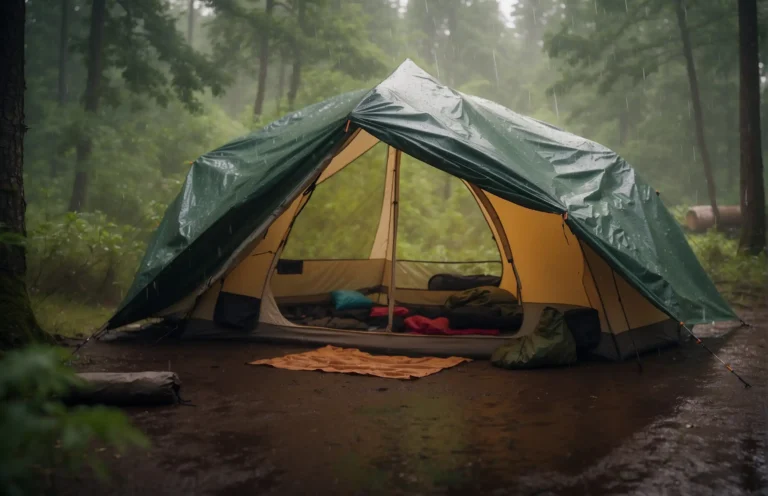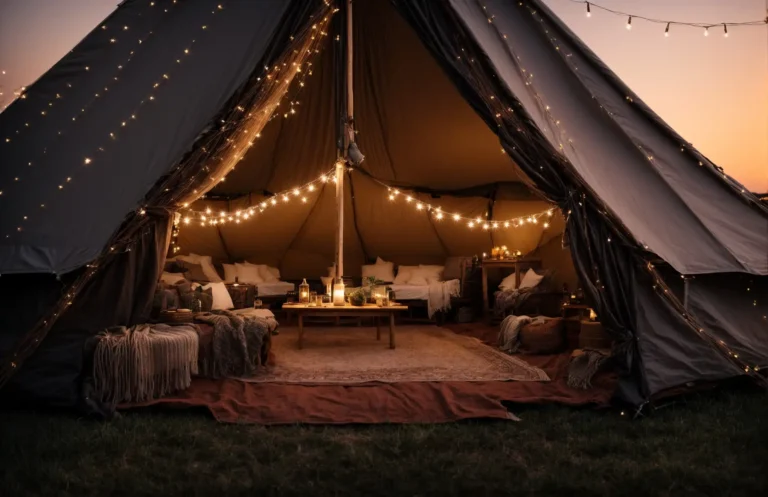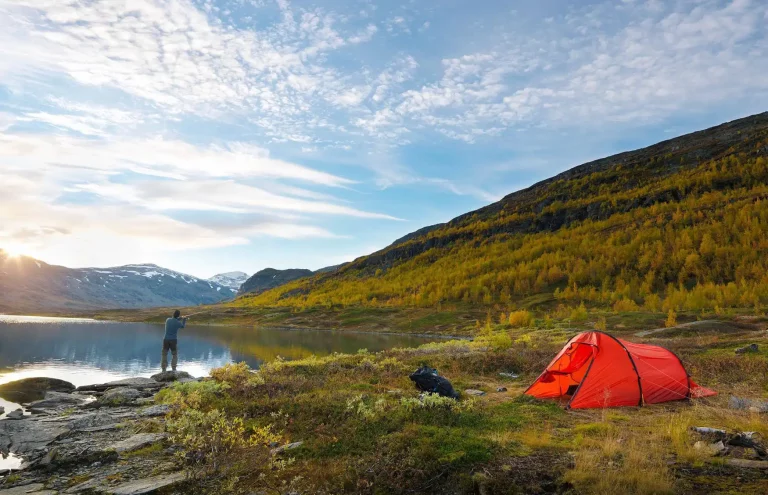How Old Do You Have to Be to Go Camping: Age Policies
The minimum age to go camping alone is typically 18 years. Parental supervision is required for minors.
Embarking on a camping adventure can be an exciting prospect for individuals of all ages. It’s an opportunity to embrace the great outdoors, disconnect from daily routines, and build survival skills. While children and teenagers are welcome at most campsites, they generally need to be accompanied by adults to ensure their safety.
For solo campers, reaching the age of majority – usually 18 – is a common requirement, ensuring they can legally take responsibility for themselves. This age requirement helps maintain a safe environment for both the minors and fellow campers. Whether planning a family trip or a solo expedition, understanding these age guidelines is key to a successful camping experience. With the right preparation and awareness, camping can offer a world of adventure for eager explorers of nearly any age.
Understanding the Basics Of Camping Age Requirements
Stepping into nature and spending the night under the stars can be a transformative experience for individuals of all ages. Yet, it raises an important question: How old does one need to be to set off on a camping adventure? Understanding the age requirements for camping is essential to ensure safety and compliance with legal standards. This section of our post elucidates the basic concepts, laws, and guidelines concerning the ages at which one can embark on a camping journey.
Defining the Concept Of ‘camping Age’
When referencing camping age, one might think there is a universally agreed-upon threshold to start camping. However, rather than a strict cutoff, ‘camping age’ refers to the developmental stage at which an individual is ready to experience and enjoy camping. Readiness can be influenced by a child’s ability to adapt to new environments, physical endurance, and maturity to follow safety protocols. Furthermore, individual campsites may have their own recommendations or restrictions based on their amenities and the type of camping they accommodate.
The Legal Perspective on Camping and Age Restrictions
Legally, most campgrounds and parks do not prohibit minors from camping. However, they often require that minors be accompanied by an adult. Specific age restrictions might apply to certain activities within a campground, such as operating a boat or using a fish-cleaning station unattended. Likewise, renting a campsite often necessitates that at least one member of the party is above a certain age, usually 18, to take responsibility for the site and ensure adherence to campground rules.
| Activity | Minimum Age Requirement (May vary by location) |
|---|---|
| Site Rental | 18+ |
| Operating Watercraft | 16+ |
| Unsupervised Use of Facilities | Varies |
Role of Parental Guidance in Camping at Various Ages
When it comes to younger adventurers, the presence of a parent or guardian is crucial. They provide supervision, teach camping safety, and can intervene in case of emergencies. Age-appropriate camping experiences are key to fostering a child’s love for the outdoors. For very young children, consider starting with backyard camping to introduce the basics of sleeping outside. As children grow and mature, transitioning to more challenging environments—under consistent adult supervision—is a natural progression.
- Toddlers (2-5 years): Backyard or living room campouts for familiarity.
- Young Children (5-12 years): Family campsites with amenities and structured activities.
- Teenagers (13-17 years): More remote camping with guided responsibilities.
Parental guidance at various stages of a child’s development ensures that both safety and enjoyment are prioritized, creating memorable and formative experiences in the great outdoors.
Camping Alone: Age Limits and Considerations
Embarking on a solo camping adventure is a rite of passage for many outdoor enthusiasts. Venturing into the wilderness alone is both exhilarating and challenging. Yet, it’s essential to consider age restrictions and the maturity required for such an experience. Understanding the minimum age requirements, associated safety concerns, and the skills necessary for independent camping ensures a rewarding and secure experience. Let’s explore the critical considerations that young adventurers should take into account before setting off on a solo camping journey.
Minimum Age Requirements For Solo Camping
Legal stipulations vary widely depending on the location and the specific campground rules. Some campsites may allow teenagers as young as 16 to camp alone, while others set the minimum age at 18 or 21. It’s imperative for campers and their guardians to check the regulations of their chosen camping location. Parental consent is often required for minors, and a clear understanding of the law prevents any legal surprises upon arrival.
Safety Concerns For Young Solo Campers
- Wildlife encounters: The probability of coming across animals requires knowledge on how to store food correctly and how to react in such encounters.
- Health emergencies: First-aid proficiency and the ability to recognize and treat symptoms of common ailments are critical.
- Weather changes: Preparing for adverse weather conditions and understanding how to stay safe is a must.
- Navigational challenges: Proficiency with a map and compass or GPS devices can prevent getting lost in unfamiliar terrain.
All these factors contribute to a higher risk profile for youthful campers, and as such, supervised group camping might be more advisable until they reach an appropriate age and level of experience.
Skills And Experience Needed For Independent Camping
The transition to solo camping calls for a solid skill set and a degree of self-reliance. Key abilities include:
- Setting up and breaking down camp: Understanding how to establish a safe and efficient campsite.
- Fire building and cooking: Managing a campfire responsibly and preparing meals in the outdoors.
- Risk assessment: Identifying potential hazards and making informed decisions to mitigate risks.
- Emergency preparedness: Having contingency plans and the necessary gear to deal with unexpected situations.
A solo camper must not only possess these skills but also have the ability to apply them effectively in a real-world context. This typically comes with age, practice, and ongoing education in wilderness survival techniques.
Family and Group Camping: Involving Youth and Children
Taking children and the youth outdoors for a camping trip can be an incredible way to foster a love for nature, encourage adventure, and teach survival skills outside the classroom. From tiny tots to teens, the great outdoors offers something for everyone, making family and group camping a delightful and educational experience. Discover the joys and tips of involving younger campers in your next wilderness adventure.
Appropriate Camping Activities For Different Age Groups
Crafting an enjoyable camping experience for children entails selecting age-appropriate activities. Here’s a quick guide to keep different age groups engaged:
| Age Group | Activities |
|---|---|
| 3-5 years old | – Nature walks for sensory exploration – Scavenger hunts with pictures |
| 6-9 years old | – Simple pitching of easy-setup tents – Wildlife spotting with binoculars |
| 10-12 years old | – Basic orienteering with a map and compass – Kayaking under supervision |
| 13-18 years old | – Backpacking and multi-day hikes – Survival skill workshops, like fire making |
Supervision and Responsibilities When Camping With Minors
Ensuring safety and a structured environment is crucial when camping with minors. Individuals under the age of 18 should have a responsible adult present at all times. The following tips highlight key supervision strategies:
- Always assign an adult to keep watch, especially near water or during hikes.
- Set clear boundaries and establish a central meeting point for check-ins.
- Teach safety protocols such as what to do if they encounter wildlife or get lost.
Educational Benefits of Camping For Young Participants
Camping not only is a source of fun but also acts as an informal classroom. Young campers gain invaluable skills and knowledge through active participation. Among these benefits are:
- Environmental stewardship: Children learn to respect wildlife and understand the importance of conservation.
- Social skills: Team activities foster communication and collaboration among peers.
- Problem-solving: Campsite challenges offer real-life scenarios to develop critical thinking.
Organized Camping Trips: Regulations and Guidelines
Exploring the great outdoors through camping can be a thrilling adventure for people of all ages. Organized camping trips, in particular, offer structured opportunities for children and adolescents to enjoy nature while ensuring safety and compliance with regulations. These trips come with specific guidelines to protect young campers and provide a supportive environment for learning and growth.
Summer Camps and Age-specific Programs
Summer camps offer a vibrant lineup of outdoor activities tailored to different age groups. It’s important to note that each camp has its own set of age requirements, often influenced by the complexity of the activities and the level of supervision needed. These programs are meticulously planned to cater to the developmental needs of campers, with age ranges typically starting from as young as 5 years old for day camps, to teenage years for more adventurous expeditions.
- Day Camps: Usually for ages 5-12, focusing on local exploration and light activities.
- Overnight Camps: Often for ages 7 and up, with overnight stays and a broader range of activities.
- Adventure Camps: Geared towards ages 10 and above, with more challenging wilderness experiences.
Legal Liability and Consent Forms For Underaged Campers
When it comes to campers under the age of 18, legal considerations come into play. Camp organizers are required to obtain consent forms and waivers signed by parents or legal guardians. These documents not only grant permission for the child’s participation but also outline the risks involved and the camp’s liability. Furthermore, they often include emergency medical authorizations and health information vital for the safety of the campers.
Role of Chaperones and Camp Counselors In Youth Camps
A crucial aspect of organized camping trips for the youth is the presence of qualified chaperones and camp counselors. These individuals are responsible for providing supervision, mentoring, and ensuring the safety of the campers. Qualifications for counselors and chaperones vary, but they typically include background checks, training in first aid, and experience in child development and outdoor leadership. Their roles extend from overseeing daily activities to fostering a positive and inclusive camp environment.
| Counselor Qualification | Description |
|---|---|
| Background Checks | Ensuring the safety and integrity of staff working with children. |
| First Aid Certification | Preparedness to respond to health emergencies. |
| Child Development Training | Ability to support the social and emotional needs of campers. |
| Outdoor Leadership Experience | Proficiency in conducting and supervising camping activities. |
Internationally: Age Restrictions and Camping Cultures Abroad
Embarking on a camping adventure is a rite of passage for many, but how does this experience differ across the globe? From solitary wilderness treks to family-friendly caravan parks, the concept of camping is universally cherished, yet the protocols, age restrictions, and cultural norms surrounding it can vary greatly from country to country. Let’s wander through the tapestry of global camping cultures and learn about the diverse age requirements and youth engagement in outdoor escapades around our planet.
Comparing Age Requirements For Camping Around the World
The freedom to camp independently is not only a personal milestone but also subject to differing international laws and practices. In many countries, there isn’t a legal minimum age for camping; however, it’s generally understood that campers below the age of 18 should have adult supervision. The specifics can change with jurisdiction and campsite rules:
- In the US, most state parks require campers to be at least 18 to reserve a campsite, but they can accompany adults at any age.
- Across the European Union, many campsites permit teenagers to camp either solo or in groups with parental permission starting from around 16.
- In Australia and New Zealand, guidance notes echo similar sentiments, with young campers advised to be accompanied by adults.
Despite these broadly stated norms, individual campgrounds may set their own policies. Always check the rules of your chosen site before setting out.
Cultural Influences on Youth Engagement in Camping
Cultural norms have a profound impact on how youths interact with camping. In countries such as Sweden and Canada, with their vast expanses of natural beauty and public rights of access (Allemansrätten in Sweden), youth engagement starts early on, fostering a deep connection with the outdoors.
Scandinavia particularly stands out, as family camping is considered nearly a cultural cornerstone; meanwhile, in places like Japan, youth camping often aligns with organized events or school trips, focusing on group activities and learning experiences.
International Youth Camping Organizations and Their Policies
When it comes to structured camping and outdoor groups, several international organizations offer programs for young people. These groups not only facilitate youth camps but also ensure safety through well-defined policies:
| Organization | Minimum Age Requirements | Policy Highlights |
|---|---|---|
| Scouts | Varies by country, typically 6+ | Emphasizes leadership, survival skills, and social responsibility. |
| Guides | Varies by country, usually similar to Scouts | Focuses on empowering young girls and fostering independence through outdoor activities. |
| Camp America | 18+ | Offers young adults opportunities to work with children in camp settings across the US. |
| International Camp Counselor Program (ICCP) | 18-30 | Provides cultural exchange opportunities for young adults to work in American summer camps. |
Each organization typically sets safety, supervision, and age-based policies in line with the countries they operate in. It’s vital for potential participants or their guardians to review and understand these before joining.
Also know: How to Keep Food Cold While Camping
Conclusion
Wrapping up our outdoor adventure discussion, age is just a number for camping. Be sure to consider legal guidelines and personal preparedness. Start planning your trip and embrace nature, regardless of your age bracket.
Keep coming back for fresh, exciting camping content in our Learning category at Outdoor Awaits. Happy camping!

